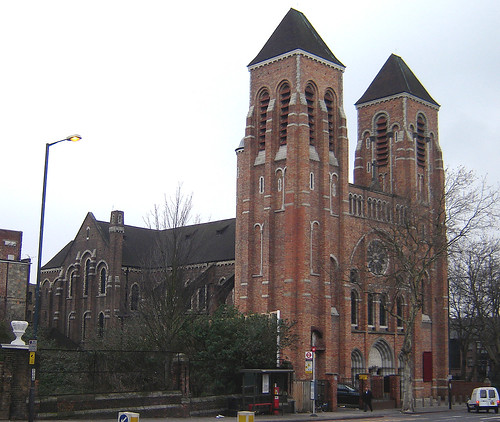London interlude
In January 1978 I moved to Crouch End in North London. The nearest Catholic church was in Muswell Hill, and I discovered that a woman was starting a choir. She explained that she was trying to get together a group to sing the English liturgy. It was not quite what I had expected, which was that it would be a choir for singing Gregorian chant. Nevertheless I was willing to give it a go. It turned out that we would be singing in English, and so I assumed that we would be singing music from the Anglican repertoire - which has no shortage of good quality material from the Tudor period onwards. But there was another agenda. We were introduced to a young man by the name of Paul Inwood, who handed out sheets of music he had composed himself. It was difficult to sing and sounded awful. I stopped after a couple of weeks and never discovered if the attempt to start a choir came to anything.
After that I migrated to the Jesuit church of St Ignatius, Stamford Hill, which was a bit of a hike away. The choirmaster was David Williams. The repertoire was slightly more ambitious than the Hove choir, but we usually pulled it off. The pieces included Jubilate Deo K117 by Mozart, Ave Verum Corpus by Byrd, a Kyrie by Viadana, and Factus es repente by Achinger. The latter was sung at a confirmation service with the bishop present and went badly wrong in the second half, at which point David lost his temper. The Sunday High Mass alternated between Latin and English. Despite the odd hiccough, it was a good choir to be in and I was sorry to leave it after just four months when I returned to Hove and the choir at St Peter's.
In January 1978 I moved to Crouch End in North London. The nearest Catholic church was in Muswell Hill, and I discovered that a woman was starting a choir. She explained that she was trying to get together a group to sing the English liturgy. It was not quite what I had expected, which was that it would be a choir for singing Gregorian chant. Nevertheless I was willing to give it a go. It turned out that we would be singing in English, and so I assumed that we would be singing music from the Anglican repertoire - which has no shortage of good quality material from the Tudor period onwards. But there was another agenda. We were introduced to a young man by the name of Paul Inwood, who handed out sheets of music he had composed himself. It was difficult to sing and sounded awful. I stopped after a couple of weeks and never discovered if the attempt to start a choir came to anything.
After that I migrated to the Jesuit church of St Ignatius, Stamford Hill, which was a bit of a hike away. The choirmaster was David Williams. The repertoire was slightly more ambitious than the Hove choir, but we usually pulled it off. The pieces included Jubilate Deo K117 by Mozart, Ave Verum Corpus by Byrd, a Kyrie by Viadana, and Factus es repente by Achinger. The latter was sung at a confirmation service with the bishop present and went badly wrong in the second half, at which point David lost his temper. The Sunday High Mass alternated between Latin and English. Despite the odd hiccough, it was a good choir to be in and I was sorry to leave it after just four months when I returned to Hove and the choir at St Peter's.

Kommentarer